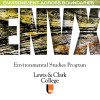The ENVS Capstone
Each ENVS major completes an original capstone project during their senior year. An ENVS capstone is far more than a typical term paper or course project! Our majors cultivate high-quality interdisciplinary environmental research skills, and document these skills in a manner they publicly share. The capstone draws upon their entire experience in environmental studies at Lewis & Clark College, and results in an outcome that supports their next academic and professional steps following graduation.
The ENVS capstone draws upon the student’s area of interest as initially defined in ENVS 220 (Environmental Analysis), and updated via student presentations prior to ENVS 400 (Senior Seminar), in which the capstone is completed. Areas of interest from 2012–18, and 2020, are available in our digital archives. ENVS capstone outcomes from 2012-18, and select outcomes from 2019-2023, are also available in archived format. Please contact ENVS faculty or staff to see additional student Areas of Interest.
Below is some additional information on the capstone process and outcome.
-
The ENVS capstone follows key approaches our students cultivate in environmental studies:
- Situated research, in which they address a general environmental topic via a focused geographical context… a place. The situated approach is also known as the hourglass, as the capstone research process starts and ends in a broad manner, with situated analysis in the middle. This situated approach offers our students a grounded basis to say something big about an environmental issue!
- Asking questions. Our students have learned in their ENVS courses that genuine environmental progress comes from asking better questions. This lesson applies directly to their capstone via framing and focus questions: the broad questions that motivate their capstone, and the specific questions they address via situated research.
- Data, methods, theories, and frameworks. A capstone spans the full range of environmental analysis, building on broad conceptual foundations (theories and frameworks) and applying them to careful empirical research (data and methods). Doing high-quality conceptual and empirical analysis distinguishes their capstones relative to research that attends only to one or the other.
-
Here are some choices our students make as to the capstone:
- Thesis vs. alternative outcome. All ENVS students will do a situated research project for their capstone as summarized above, but this research can result in either a thesis—an extended scholarly manuscript—or a non-thesis outcome, such as a curriculum, a technical report, or even a creative work such as a podcast! Our students’ choice of an outcome is often guided by their post-graduation plans, and what would best support their professional and/or academic trajectory. (All students complete a mini-thesis to evidence their scholarly skills in situated research.)
- Honors vs. regular capstone. Students with a minimum 3.5 GPA in the ENVS major may consider submitting their capstone (thesis or alternative outcome) for honors consideration. Students pursuing honors are nominated based on the scholarly quality and creativity of their draft capstones, typically submitted one month prior to the end of the semester. Those offered this opportunity will then do an oral defense following spring break, and ENVS faculty will award honors—a rare and distinguished award, announced annually at Lewis & Clark College’s honors convocation—based on their draft and defense.
A typical capstone project is one of the biggest an ENVS major does in their undergraduate experience. Here are some milestones:
- Years 2-4: Define an initial area of interest, explore it via multiple classes, then share an area of interest update alongside other ENVS majors in the fall preceding your capstone semester.
- Summer before year 4: Start brainstorming possible framing/focus questions and data/methodology.
- Fall of year 4: Informally consult with ENVS faculty and fellow students on above to help settle broad hourglass approach.
- Year 4 winter break: Informal collaborative work with fellow ENVS seniors around common topics, situated contexts, and methods. Optional: initial data collection/analysis to explore viability of focus question.
-
Spring semester year 4: Complete capstone via sequential steps in ENVS 400:
- Weeks 1-2: Apply area of interest toward settling top of hourglass (framing) question; develop literature to justify and contextualize framing question, working in common question teams.
- Weeks 3-4: Explore possible situated contexts, including comparative (>1 context) options. Work in common situated context teams to document multiple dimensions of situated context. Post-graduation next steps activities to start here as well.
- Weeks 5-6: Pose possible research (focus) questions to address framing question in situated context. Consider methodological tools alongside others sharing these methods.
- Week 7 (early March): Document/share top/middle of hourglass work to date in mini-presentation to fellow ENVS 400 students. Discuss/finalize thesis vs. non-thesis outcomes.
- Weeks 8-9: Work on capstone outcomes to share complete draft by late March spring break.
- Weeks 10-11: Revise outcomes. Finalize bottom of hourglass sections. Nominated honors candidates arrange/perform oral defense.
- Weeks 12-13. Develop capstone posters; share mini-presentations toward peer feedback.
- Weeks 14-15: Final outcomes. ENVS 400 and/or public poster event.
If you have questions about the ENVS capstone process, please contact your ENVS core course instructor or the ENVS Program.
Environmental Studies is located in room 343A of John R. Howard Hall on the Undergraduate Campus.
MSC: 62
email envs@lclark.edu
voice 503-768-7790
fax 503-768-7620
Symposium Advisor Jessica Kleiss
Environmental Studies
Lewis & Clark
615 S. Palatine Hill Road MSC 62
Portland OR 97219
